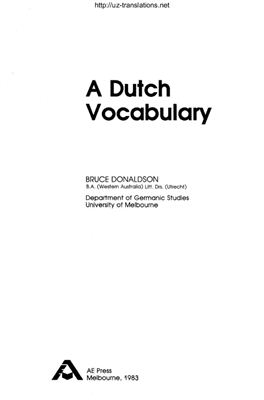Hyperion Books, 1985. - 96 p.
Bruce Donaldson’s ‘A Dutch Vocabulary’. Donaldson’s book lists frequently used Dutch words and their English translation by theme. The book was first published in the 1980s, but has been out of print for years. The Association of Dutch Teachers of Victoria inc. believe it highly valuable to have a theme-based word list to help Dutch leaers expand their vocabulary.
Dutch (About this sound Nederlands (help·info)) is a West Germanic language spoken by over 22 million people as a native language and over 5 million people as a second language. Most native speakers live in the Netherlands, Belgium, and Suriname, with smaller groups of speakers in parts of France, Germany and several former Dutch colonies. It is closely related to other West Germanic languages (e.g. , English, Scots, West Frisian and German) and also to the North Germanic languages.
Dutch is the parent language of Afrikaans and of several creole languages, most of which are now extinct. The Dutch Language Union coordinates actions of the Dutch, Flemish and Surinamese authorities in linguistic issues, language policy, language teaching and literature.
In English the language of the people of the Netherlands and Flanders is referred to as Dutch; or rarely (usually in technical linguistic contexts) as Netherlandic;Flemish is a term which refers specifically to Belgian Dutch, Dutch as spoken in Belgium.
The origins of the word Dutch go back to Proto-Germanic, the ancestor of all Germanic languages, *?eudiskaz (meaning "national/popular"); a cognate of Old Dutch diets, Old High German duitsch, Old English ?eodisc and Gothic ?iuda all meaning "(of) the common (Germanic) people". As the tribes among the Germanic peoples began to differentiate, its meaning began to change. The Anglo-Saxons of England for example gradually stopped referring to themselves as ?eodisc and instead started to use Englisc, after their tribe. On the continent *theudo evolved into two meanings: Diets (meaning "Dutch (people)" archaic ) and Deutsch (German, meaning "German (people)"). At first the English language used (the contemporary form of) Dutch to refer to any or all of the Germanic speakers on the European mainland (e.g. the Dutch, the Flemish and the Germans). For example, in Gulliver's Travels, German is called "High Dutch", whereas what we call Dutch today is called "Low Dutch". Gradually its meaning shifted to those Germanic people they had most contact with, both because their geographical proximity, but also because of the rivalry in trade and overseas territories: the people from the Dutch Republic, the Dutch.
In Dutch, the language is referred to as Nederlands. It derives from the Dutch word "neder", a cognate of English "nether", both meaning "low" and "neath", and "land" (same meaning in both English and Dutch), a reference to the geographical texture of the Dutch homelands, the weste and lowest portion of the Northe European plain.
Bruce Donaldson’s ‘A Dutch Vocabulary’. Donaldson’s book lists frequently used Dutch words and their English translation by theme. The book was first published in the 1980s, but has been out of print for years. The Association of Dutch Teachers of Victoria inc. believe it highly valuable to have a theme-based word list to help Dutch leaers expand their vocabulary.
Dutch (About this sound Nederlands (help·info)) is a West Germanic language spoken by over 22 million people as a native language and over 5 million people as a second language. Most native speakers live in the Netherlands, Belgium, and Suriname, with smaller groups of speakers in parts of France, Germany and several former Dutch colonies. It is closely related to other West Germanic languages (e.g. , English, Scots, West Frisian and German) and also to the North Germanic languages.
Dutch is the parent language of Afrikaans and of several creole languages, most of which are now extinct. The Dutch Language Union coordinates actions of the Dutch, Flemish and Surinamese authorities in linguistic issues, language policy, language teaching and literature.
In English the language of the people of the Netherlands and Flanders is referred to as Dutch; or rarely (usually in technical linguistic contexts) as Netherlandic;Flemish is a term which refers specifically to Belgian Dutch, Dutch as spoken in Belgium.
The origins of the word Dutch go back to Proto-Germanic, the ancestor of all Germanic languages, *?eudiskaz (meaning "national/popular"); a cognate of Old Dutch diets, Old High German duitsch, Old English ?eodisc and Gothic ?iuda all meaning "(of) the common (Germanic) people". As the tribes among the Germanic peoples began to differentiate, its meaning began to change. The Anglo-Saxons of England for example gradually stopped referring to themselves as ?eodisc and instead started to use Englisc, after their tribe. On the continent *theudo evolved into two meanings: Diets (meaning "Dutch (people)" archaic ) and Deutsch (German, meaning "German (people)"). At first the English language used (the contemporary form of) Dutch to refer to any or all of the Germanic speakers on the European mainland (e.g. the Dutch, the Flemish and the Germans). For example, in Gulliver's Travels, German is called "High Dutch", whereas what we call Dutch today is called "Low Dutch". Gradually its meaning shifted to those Germanic people they had most contact with, both because their geographical proximity, but also because of the rivalry in trade and overseas territories: the people from the Dutch Republic, the Dutch.
In Dutch, the language is referred to as Nederlands. It derives from the Dutch word "neder", a cognate of English "nether", both meaning "low" and "neath", and "land" (same meaning in both English and Dutch), a reference to the geographical texture of the Dutch homelands, the weste and lowest portion of the Northe European plain.

